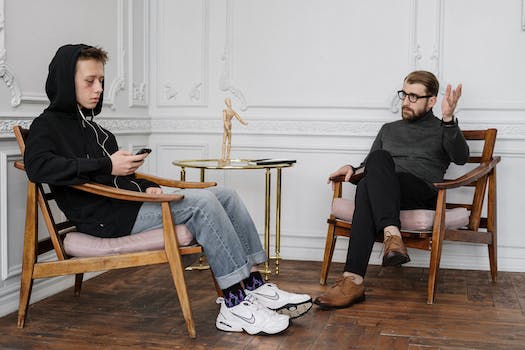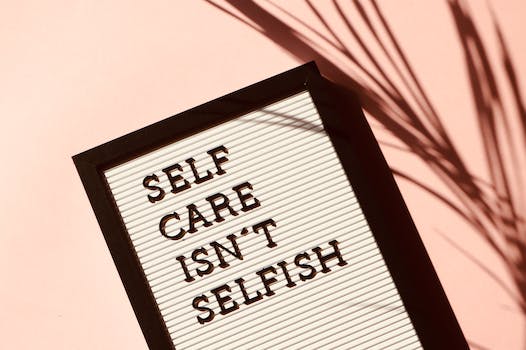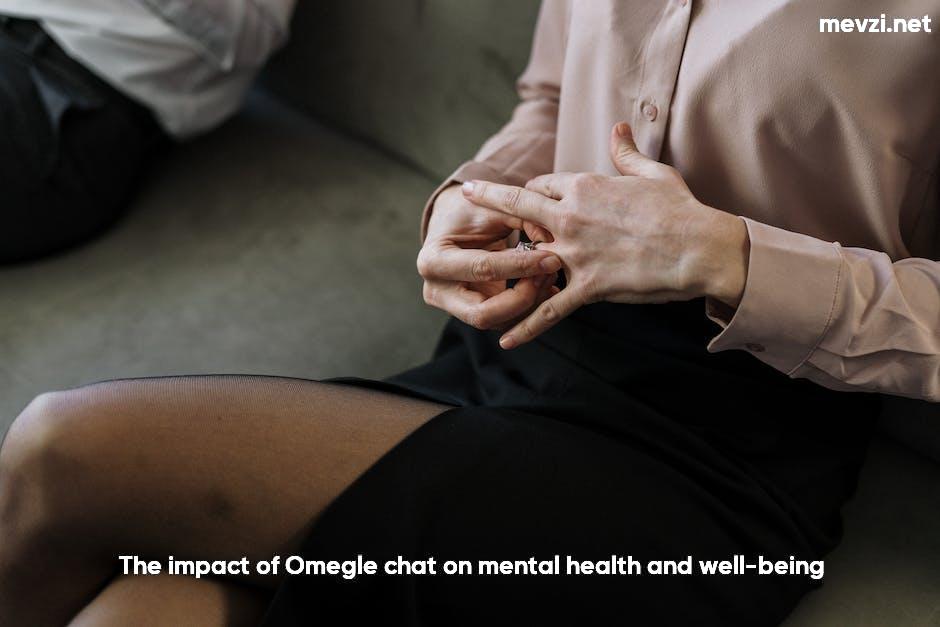Omegle, an anonymous online chat platform, has gained significant popularity over the years. While it offers a platform for people to meet and talk to strangers, it also raises concerns about its impact on mental health and well-being.
Firstly, the anonymous nature of Omegle can be both a blessing and a curse. It allows individuals to freely express themselves without the fear of judgment or consequences. However, this anonymity also means that people may feel free to engage in inappropriate or harmful behavior. This can lead to instances of cyberbullying, harassment, or exposure to explicit content, which can negatively impact one’s mental health.
Furthermore, the unpredictable nature of Omegle can lead to feelings of anxiety and stress. Users never know who they will be paired with, and there is no way to filter out age-inappropriate or offensive content. This lack of control can be distressing and can increase feelings of unease, especially for those who are already vulnerable or struggling with mental health issues.
Moreover, the constant exposure to strangers and their opinions can also impact one’s self-esteem and self-worth. Online discussions on Omegle can sometimes turn hostile, leaving individuals with negative emotions and self-doubt. The pressure to impress or fit in with strangers can become overwhelming and contribute to feelings of inadequacy or social anxiety.
Lastly, excessive use of Omegle can lead to social isolation and reduced real-life human interaction. While online communication can be convenient, it cannot replace meaningful connections formed through face-to-face interactions. A lack of genuine social interactions can have detrimental effects on mental health, leading to loneliness, depression, and decreased well-being.
It is essential to highlight the potential risks associated with Omegle and educate users about maintaining their mental health while using the platform. Implementing stricter moderation and reporting systems, as well as promoting mental health resources within the platform, can contribute to a safer and healthier online environment.
In conclusion, while Omegle offers a unique online chatting experience, it can have a significant impact on mental health and well-being. The anonymity, unpredictability, and potential exposure to harmful content can lead to various negative consequences. It is crucial for users to be aware of these risks and take necessary measures to protect their mental health while engaging with Omegle’s platform. 
The rise of Omegle chat: A threat to mental health?
In today’s digital age, where social media platforms have become a norm for communication, a new trend has emerged – Omegle chat. This anonymous online chat platform has gained immense popularity among teenagers and young adults. However, the question arises, is Omegle chat a threat to mental health?
Omegle chat allows users to have random conversations with strangers without revealing their true identity. While this may seem exciting and adventurous, it also opens up a Pandora’s box of potential dangers and psychological risks.
The dark side of anonymous conversations
One of the primary concerns surrounding Omegle chat is the anonymity it offers. While anonymity may seem liberating, it also gives individuals the freedom to be someone they’re not. This can lead to the creation of false identities or engaging in dishonest conversations.
Moreover, the lack of accountability in anonymous conversations can lead to cyberbullying, harassment, or even grooming. Users may feel emboldened to engage in offensive or harmful behavior, knowing that there are no consequences for their actions.
The psychological impact
Engaging in anonymous conversations on Omegle chat can have a detrimental effect on one’s mental health. As humans, we have an innate need for connection and authentic relationships. However, interacting with strangers without any background information or context can leave individuals feeling isolated and disconnected.
Furthermore, the unpredictability of these conversations can induce anxiety and stress. Not knowing who you’ll encounter or what kind of conversation you’ll have can be overwhelming for many individuals, especially those already prone to anxiety or depression.
Protecting mental health in the digital world
While it’s essential to address the potential risks of Omegle chat, it’s also crucial to educate individuals about digital well-being and the importance of establishing healthy boundaries. Here are a few strategies to protect mental health:
- Limit screen time: Spending excessive hours on Omegle chat can disrupt daily routines, sleep patterns, and personal relationships. Set boundaries and allocate time for other activities.
- Practice mindful communication: Before delving into anonymous conversations, consider the potential risks and consequences. Be vigilant of your own behavior and report any instances of abuse or harassment.
- Seek support: If the use of Omegle chat or any other online platform is negatively affecting your mental health, reach out for support. Talk to trusted friends, family, or seek professional help if necessary.
Remember, while Omegle chat may offer a temporary escape or excitement, it’s essential to prioritize your mental well-being. Establish healthy online habits and foster meaningful connections that positively contribute to your overall happiness and fulfillment.

Understanding the psychological effects of using Omegle chat
In today’s digital age, communication has become increasingly convenient and accessible. With just a few clicks, we can connect with people from all around the world. However, the rise of online platforms like Omegle chat has brought its fair share of concerns, particularly when it comes to the psychological effects it can have on its users.
Omegle chat, known for its anonymous and random nature, allows individuals to chat with strangers without revealing their identities. While it may seem like a harmless way to pass the time or meet new people, the reality is that it can have a profound impact on one’s mental well-being.
One of the main psychological effects of using Omegle chat is the feeling of anonymity. As users engage in conversations with strangers, they often let their guard down and share personal information or thoughts that they wouldn’t normally do in face-to-face interactions. This sense of anonymity can lead to a false sense of security, making individuals more vulnerable to manipulative or harmful behavior.
Moreover, the unpredictable nature of Omegle chat can also take a toll on one’s mental health. The constant exposure to strangers and their varying attitudes, beliefs, and opinions can be overwhelming. The lack of control over who you are matched with can result in feelings of anxiety, fear, or even harassment.
- Increased social anxiety
- Isolation and loneliness
- Lack of trust in online interactions
- Exposure to explicit or inappropriate content
- Emotional distress
Additionally, the addictive nature of Omegle chat cannot be overlooked. The thrill of meeting new people and the constant anticipation of who you will be matched with can lead to excessive usage and a neglect of real-life relationships and responsibilities.
It is crucial to approach the use of Omegle chat with caution and awareness of its potential psychological effects. Users should prioritize their mental well-being and set boundaries to prevent negative experiences. It is also advisable to seek professional help if the psychological impact becomes overwhelming.
In conclusion, while Omegle chat offers a unique and exciting way to connect with strangers, it is essential to understand and address the potential psychological effects it can have. By being mindful of our online interactions and taking steps to protect our mental well-being, we can navigate the digital world more safely and responsibly.

Exploring the Connection between Omegle Chat and Increased Anxiety
In today’s digital age, communication has become more accessible than ever. With just a few clicks or taps, individuals can connect with people from all around the world. One such platform that has gained popularity is Omegle chat. However, recent studies have suggested a potential link between Omegle chat and increased anxiety levels among its users.
Omegle chat, known for its random video and text-based conversations, allows users to interact with strangers anonymously. While this feature may seem exciting to some, it also brings about a sense of uncertainty and unpredictability.
One of the main concerns with Omegle chat is the lack of control over the conversation partners. Users have reported encountering individuals who engage in inappropriate or offensive behavior, leading to feelings of discomfort, vulnerability, and even fear. This constant exposure to negative experiences can significantly impact one’s mental well-being.
Another factor contributing to increased anxiety is the pressure to constantly engage in conversation. Omegle chat promotes a continuous stream of interactions, encouraging users to maintain conversations for extended periods. This can result in feelings of social anxiety, as individuals may feel pressured to impress or entertain their chat partners.
Additionally, the addictive nature of Omegle chat can exacerbate anxiety levels. Users may find themselves spending excessive amounts of time engaging in conversations, leading to neglect of other important aspects of their lives. This neglect can further contribute to feelings of stress and anxiety.
To better understand the impact of Omegle chat on mental health, a study was conducted among a group of college students. The research aimed to assess the correlation between Omegle chat usage and anxiety levels. The results revealed a significant positive relationship, indicating that increased usage of the platform was associated with higher levels of anxiety.
It is crucial to prioritize mental well-being when using platforms like Omegle chat. Here are some tips to promote a healthier online experience:
| Tips for a Healthier Online Experience |
|---|
| 1. Set Boundaries: Establish limits on the amount of time spent on Omegle chat to prevent excessive usage and prioritize other activities. |
| 2. Choose Conversations Wisely: Be selective with whom you engage in conversations. Trust your instincts and exit conversations that make you uncomfortable. |
| 3. Take Breaks: Regularly take breaks from Omegle chat to give yourself a chance to recharge and focus on other aspects of your life. |
| 4. Seek Support: If the anxiety becomes overwhelming, reach out to friends, family, or a mental health professional for support and guidance. |
While Omegle chat offers an opportunity for global connections, it is essential to be aware of the potential impact it can have on mental health. By understanding the risks and practicing self-care, individuals can navigate these platforms in a way that promotes well-being and prevents anxiety.
Remember, your mental health should always be a priority.

Is Omegle chat contributing to social isolation and loneliness?
In today’s digital age, it is undeniable that technology plays a significant role in our daily lives. One of the platforms that has gained immense popularity in recent years is Omegle chat. This online chat service allows users to connect with strangers from around the world and engage in anonymous conversations. While it may seem like a harmless pastime, there is growing concern about the potential negative impact of Omegle on social isolation and loneliness.
One of the key factors contributing to social isolation is the lack of meaningful connections. In traditional social interactions, individuals have the opportunity to engage in face-to-face conversations, read body language, and build rapport. However, Omegle chat eliminates these essential elements of effective communication. Users are often faced with the challenge of truly connecting with others and building genuine relationships.
Moreover, Omegle chat’s anonymous nature can lead to a sense of detachment and emotional disconnection. When users are not held accountable for their actions and words, they may engage in disrespectful or inappropriate behavior without facing any consequences. This can further isolate individuals and discourage them from seeking meaningful social interactions.
Furthermore, spending excessive amounts of time on Omegle chat can hinder individuals from engaging in offline social activities. Instead of investing time in building friendships and maintaining real-life connections, users may find solace and entertainment solely in the virtual world. The lack of face-to-face interactions can ultimately contribute to feelings of loneliness and detachment from the real world.
- Increased screen time: Omegle chat often leads to prolonged screen time, which can negatively impact mental health and overall well-being.
- Impersonal interactions: The lack of personal connection and emotional resonance in Omegle chat can leave individuals feeling isolated and disconnected.
- Lack of support networks: When facing challenging times, individuals often rely on their support networks. However, Omegle chat may hinder the development of these support systems.
It is essential to acknowledge that not all experiences on Omegle chat are negative. Some individuals may find temporary connections or engage in meaningful conversations. However, it is crucial to recognize the potential risks and ensure a balanced approach to online interactions.
In conclusion, while Omegle chat offers a platform for connecting with strangers, it is important to be aware of its potential impact on social isolation and loneliness. As individuals, it is necessary to maintain a healthy balance between online and offline interactions, and actively seek out meaningful connections in our daily lives.

Strategies for maintaining mental well-being while using Omegle chat
Omegle chat has gained popularity as a platform for connecting with random strangers online. While it can be an exciting way to meet new people, it’s important to prioritize your mental well-being while using this platform. Here are some strategies to help you maintain a positive and safe experience while chatting on Omegle:
- Set boundaries: Before starting a conversation, establish your personal boundaries and be clear about what you are comfortable discussing. This will help you avoid uncomfortable situations and protect your mental well-being.
- Stay anonymous: Omegle allows you to chat anonymously, which can be beneficial for your privacy and mental health. Avoid sharing personal information that could potentially compromise your safety.
- Manage your time: It’s easy to get carried away while chatting on Omegle due to its addictive nature. Set a specific time limit for your conversations to prevent it from negatively affecting your daily routine.
- Avoid sensitive topics: Engaging in discussions about sensitive topics such as religion, politics, or personal beliefs can often lead to heated arguments and impact your mental well-being. Stick to light-hearted topics that promote positivity and enjoyment.
- Report and block: If you encounter any inappropriate behavior or feel uncomfortable during a conversation, don’t hesitate to report and block the user. Prioritizing your safety and mental health is crucial.
By implementing these strategies, you can ensure a more positive and enjoyable experience while using Omegle chat. Remember, your mental well-being should always be a priority, both online and offline. Stay safe and have fun!
Frequently Asked Questions
Question 1: What is Omegle chat?
Answer:
Omegle chat is an online platform that allows individuals to chat with strangers anonymously. It randomly pairs users in one-on-one chat sessions without revealing their identities.
Question 2: Does using Omegle chat have any impact on mental health?
Answer:
Using Omegle chat can have both positive and negative impacts on mental health. It can be a source of entertainment and provide social interaction, but it can also lead to feelings of anxiety, depression, and increased stress levels, especially when negative experiences or harassment occur during the chat.
Question 3: Are there any measures to ensure the safety of users on Omegle chat?
Answer:
Omegle provides a “Spy Mode” option that allows you to ask a question to two strangers (who can’t see each other) to maintain privacy. Additionally, users can report any inappropriate behavior or harassment they encounter, and Omegle moderators may take action against offensive users.
Question 4: Can excessive use of Omegle chat negatively affect well-being?
Answer:
Excessive use of Omegle chat can have negative effects on well-being. It may lead to decreased productivity, reduced social interactions in real life, and increased feelings of loneliness or isolation. It’s important to use Omegle chat in moderation and balance it with other activities.
Question 5: How can one mitigate the potential negative impact of Omegle chat on mental health?
Answer:
To mitigate the potential negative impact, it is recommended to set boundaries and time limits while using Omegle chat. It’s important to prioritize self-care and engage in offline activities, connect with friends or supportive communities, and seek professional help if needed. Being mindful of one’s emotional well-being and recognizing when to take breaks from using the platform is essential.

